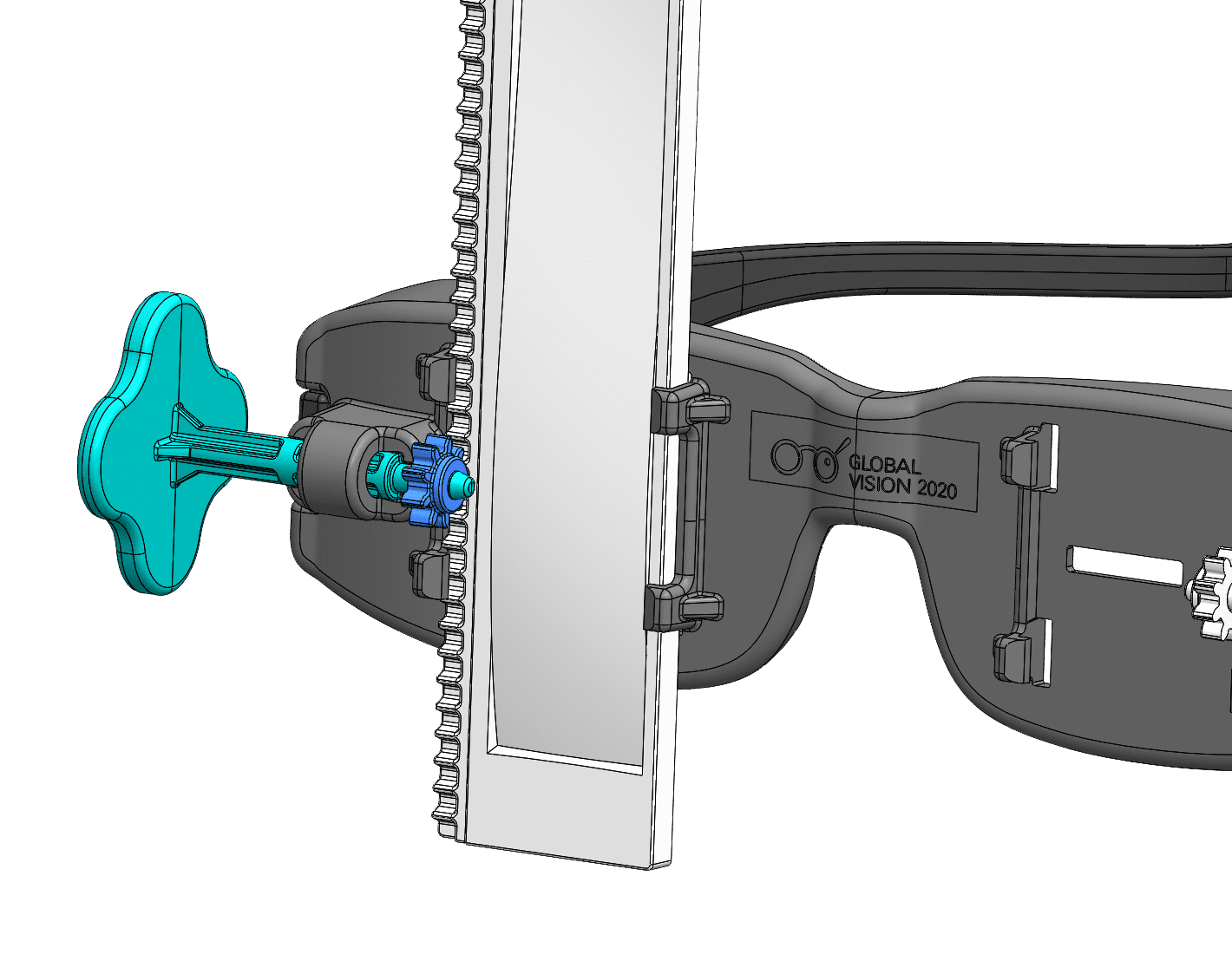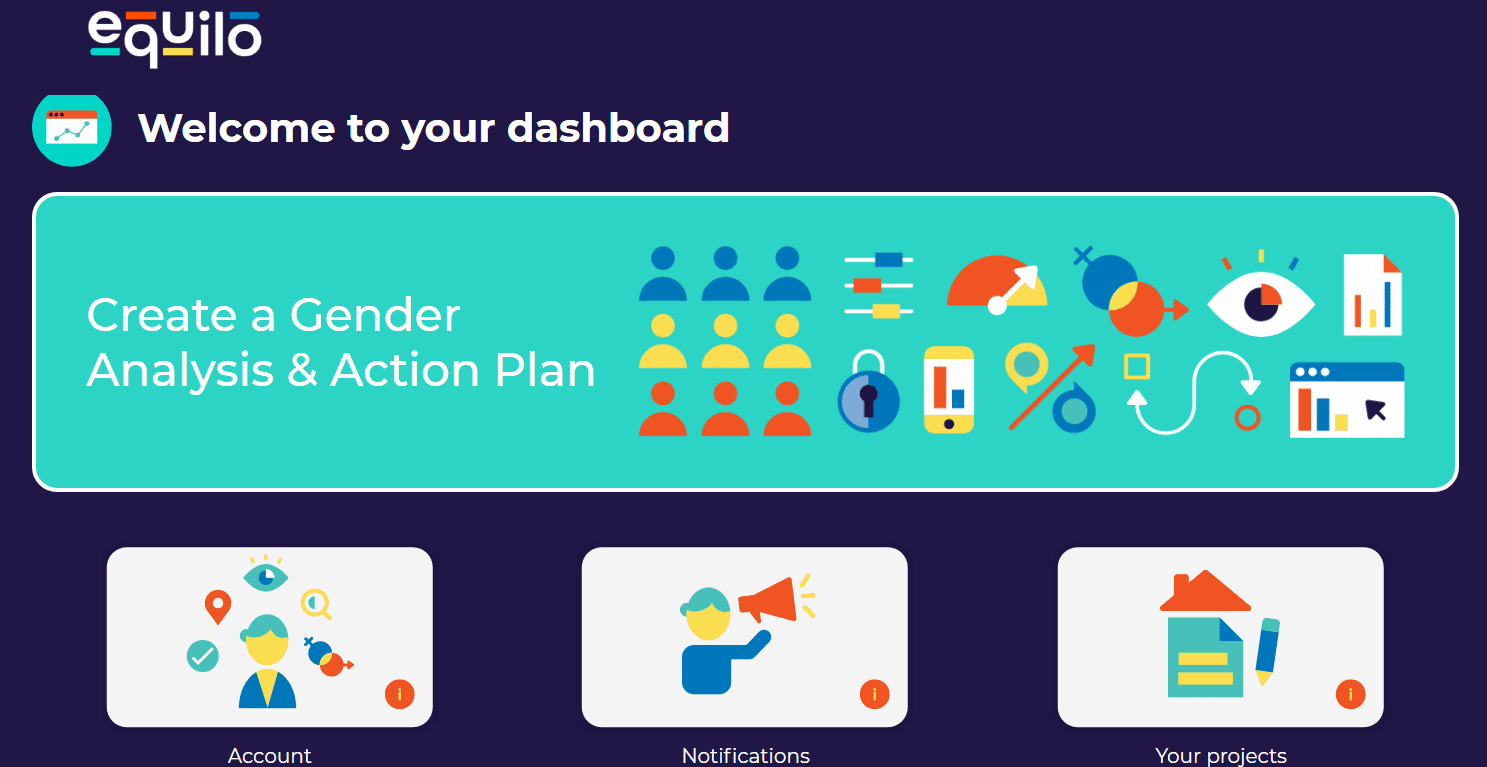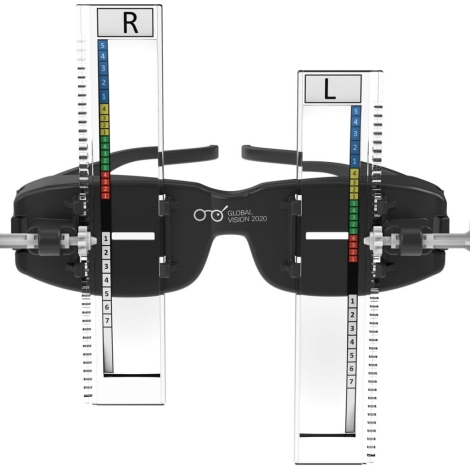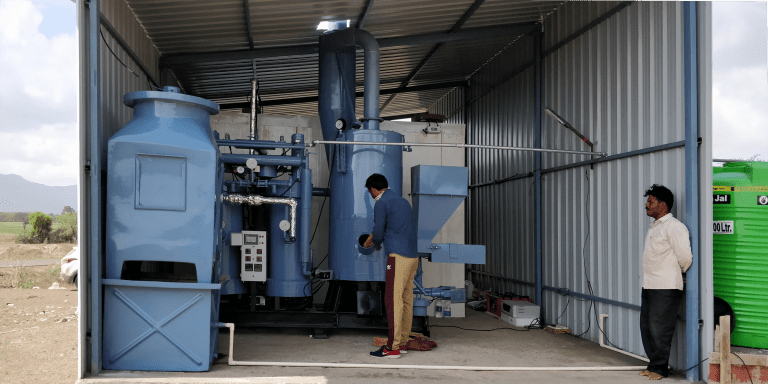A one-stop eyeglasses prescription device that evaluates vision and provides the correct lenses for (USD) $5 won the AidEx Aid Innovation Challenge, announced in November in Brussels. USee, a collaboration between the USA-based non-profit Global Vision 2020 and PolyOne, a polymer manufacturer, won €1000 and a stand at AidEx 2020 (equivalent to €3500). USee is one of four finalists out of hundreds of entries. Independent researchers, including two of Engineering for Change’s Research Fellows, reviewed the finalists. Their conclusions follow.
USee prescribes and provides eyeglasses for USD $5

The bottleneck in prescriptions for eyeglasses is not the availability of the glasses. It’s the shortage of optometrists and other specialists who can test eyes and make prescriptions.
There are 2.5 billion people worldwide who don’t have access to eye care. To meet their needs, the US non-profit Global Vision 2020 collaborated with PolyOne, a polymer manufacturer, to develop a lens prescription diagnostic device, plus the correct eyeglasses, all in one package. The USee system is designed for underserved communities and costs about (USD) $5 per person.
USee sits on a user’s face like a pair of glasses. It has a graded lens bar that the user can pull or push up and down, sliding through a range of eyeglass prescriptions until the user can see clearly. Working with a briefly trained assistant, the user can discover his or her prescription in each eye. The process is called “self refraction.” Once the prescription is determined, the assistant pops the correct plastic lenses into a frame and the patient walks away, all within a few minutes.
“Although USee can only provide SE [spherical equivalent] correction, prior studies have shown that ready-made eyeglasses of this type were still well tolerated and highly valued,” according to a paper published in PLOS One by researchers from Johns Hopkins School of Medicine in Baltimore, Maryland (USA), Global Vision 2020, and the University of Melbourne, (Australia).
The researchers studied the system in 60 patients of the Wilmer Eye Institute in Baltimore, Maryland (USAI). They concluded that the device improves vision in nearly all of the users.
“The USee is easy to use, provides significantly improved VA [visual acuity] compared to uncorrected vision, and results in vision that is 20/30 or better in over 80% of users. This system, which allows for instant distribution of glasses and immediate feedback on vision quality, could help reduce the burden of uncorrected RE [refractive error] in low-resource communities.”
For details, please see the video below and Global Vision 2020’s site: gv2020.0rg.
The Agri Recovery Kit (A.R.K)
Tech4Agri, a social enterprise with founding members from Trinidad and Tobago and Dominica, created the Agri Recovery Kit to help farmers weather natural disaster. The kit includes solar-powered communications equipment, how-to videos and seeds, compost, organic fertilizer and pesticides to restart a farm that was damaged in a hurricane, flood or other disaster.
Benson Maina, a Research Fellow at Engineering for Change, offers his quick take on the product.
The idea is really good. Especially thinking about clean water and food. After disaster occurs, most of the infrastructure gets destroyed and pollution (water, soil, air, etc.) happens. I’m not sure how they’re planning to do water cleaning for domestic use, but it’s a great idea to avoid some diseases.
Growing crops on soil-less media is also on point, especially after contamination and pollution. Though I’m not sure how much of it will be needed to grow crops to feed five people as stated in their pitch. What is the lifespan of the bag and how long can the media be re-used?
For the biodegradable plastic, I’m not sure if they are going to make it into small container, which can then hold media, fertilizer, water, etc. In one of the videos I saw the bag laid out flat. I’m not sure if that can support plants.
Questions around this include:
- What will be the source of water for growing the crops especially after disaster?
- Will the kind of crops grown require processing before consumption? If yes, will the processing plants be available and working after a natural disaster?
- Does the product consider political upheaval?
- How will you be able to collect the indigenous knowledge, land races, etc suitable for the different countries.
- What category (field crops, cereals, vegetables, etc) of crops can be grown using the technology?
For more information, please see the video below and the Agri Recovery Kit on Open IDEO’s Bridgbuilder 2019 Challenge.
Faircap water bottle filter
Faircap is a pocket-sized water filter that can be inserted and screwed onto the top of a standard plastic water bottle. A second model can be inserted into a jerrycan or bucket. Both provide clean drinking water in emergencies. The bottle-top filters remove bacteria, sediment and larger pathogens. The family-sized filters also remove viruses. E4C’s Rsearch Fellow and (now) Program Coordinator, Marilynn Holguín Clover, offers her reaction to the technology.
The feature that stands out the most about the Faircap is that it’s designed to fit onto soda plastic bottles or into a jerrycan or bucket, making it adaptable to the type of container that is most accessible to the user. It also promotes the reuse of plastic bottles, which addresses a great environmental waste problem.
Most membrane filtration systems are limited to their own container or to buckets and this can be a constraint when considering long-term use and sustainability. Because of its versatility, this product will most likely appeal to a wide range of users and be well received in the market. Hopefully, the Faircap will be accompanied by a strong distribution program that can not only provide accessible replacements when the hollow filter life comes to an end (which can be around a decade depending on the material) but also ensure that the materials from the filter are reused by receiving the items back and preventing these from becoming another type of litter.
The faircap uses the same filtration principles as the hollow fiber membrane filters listed in E4C’s Solutions Library and is similar to filters designed for individual use such as the Befree Water Filtration System 3.0L and the Sawyer PointOne Filter, but differs in that its models can be screwed into a soda plastic bottle or into a jerrycan or bucket, giving it a versatility that is not yet listed in the Solutions Library.
For more please see faircap.org.
Equilo automated gender equality analysis

Research suggests that putting women in charge of family finances and small businesses leads to better economic development and more responsible usage of the influx of cash. The United Nations may have had these data, as well as with the conviction that gender equality is a human right, when they enshrined the ambition as number five in their Sustainable Development Goals. To meet SDG 5, the institutions and businesses working to meet the goals need big data and a convenient method of analyzing it. Equilo has stepped up to offer that service as a web-based application that analyzes statistics with artificial intelligence. The platform provides numbers, suggests actions to improve deficiencies, and even adds legal and policy context, a directory of local stakeholders and downl
Equilo is a web-based application that harnesses AI to automate the delivery of customized gender equality and social inclusion (GESI) analysis that includes relevant comparative and summary statistics, suggested actions, monitoring and evaluation indicators, the legal and policy context, and a local stakeholder directory. The package is offered on a dashboard and as a downloadable report.
For more please see equilo.org.

